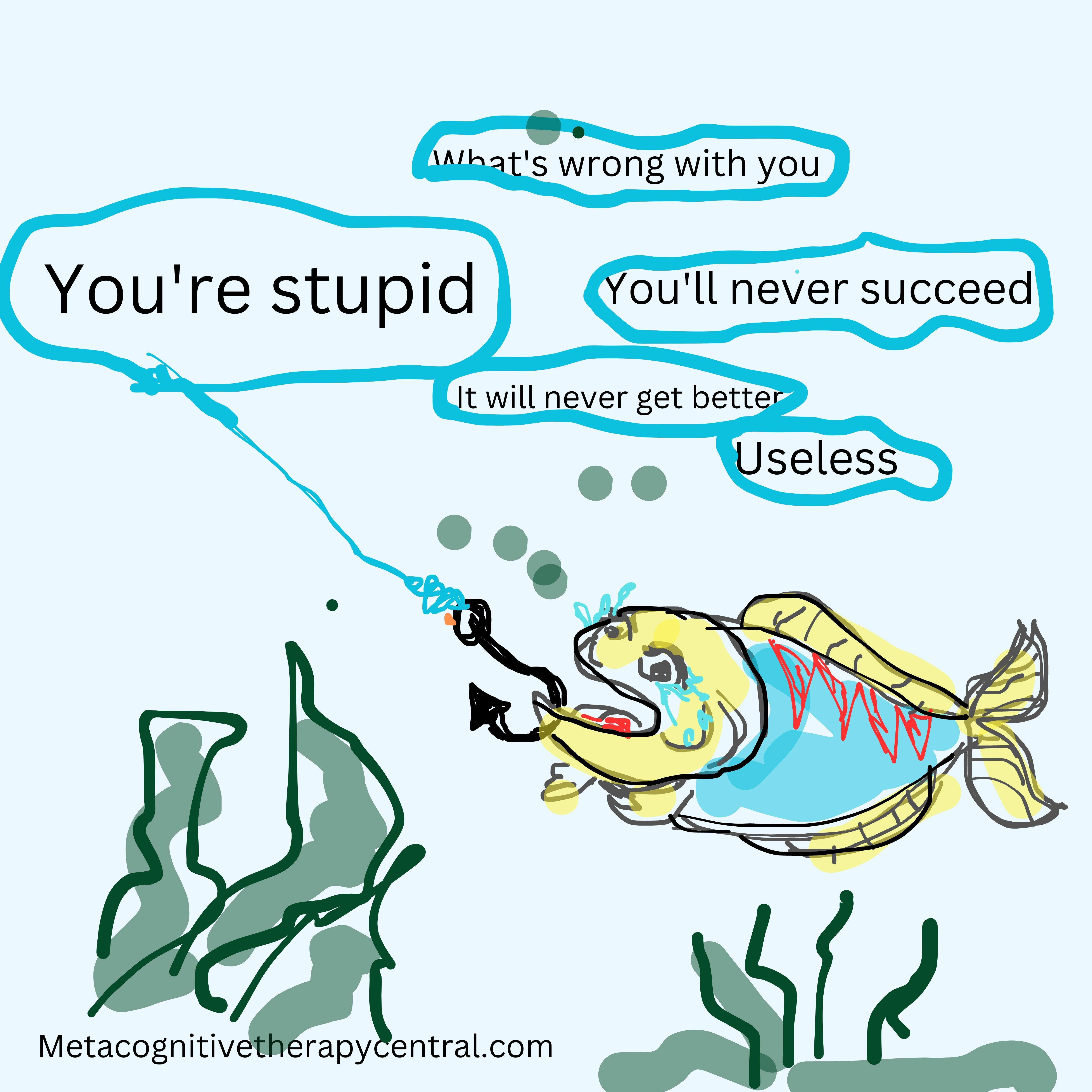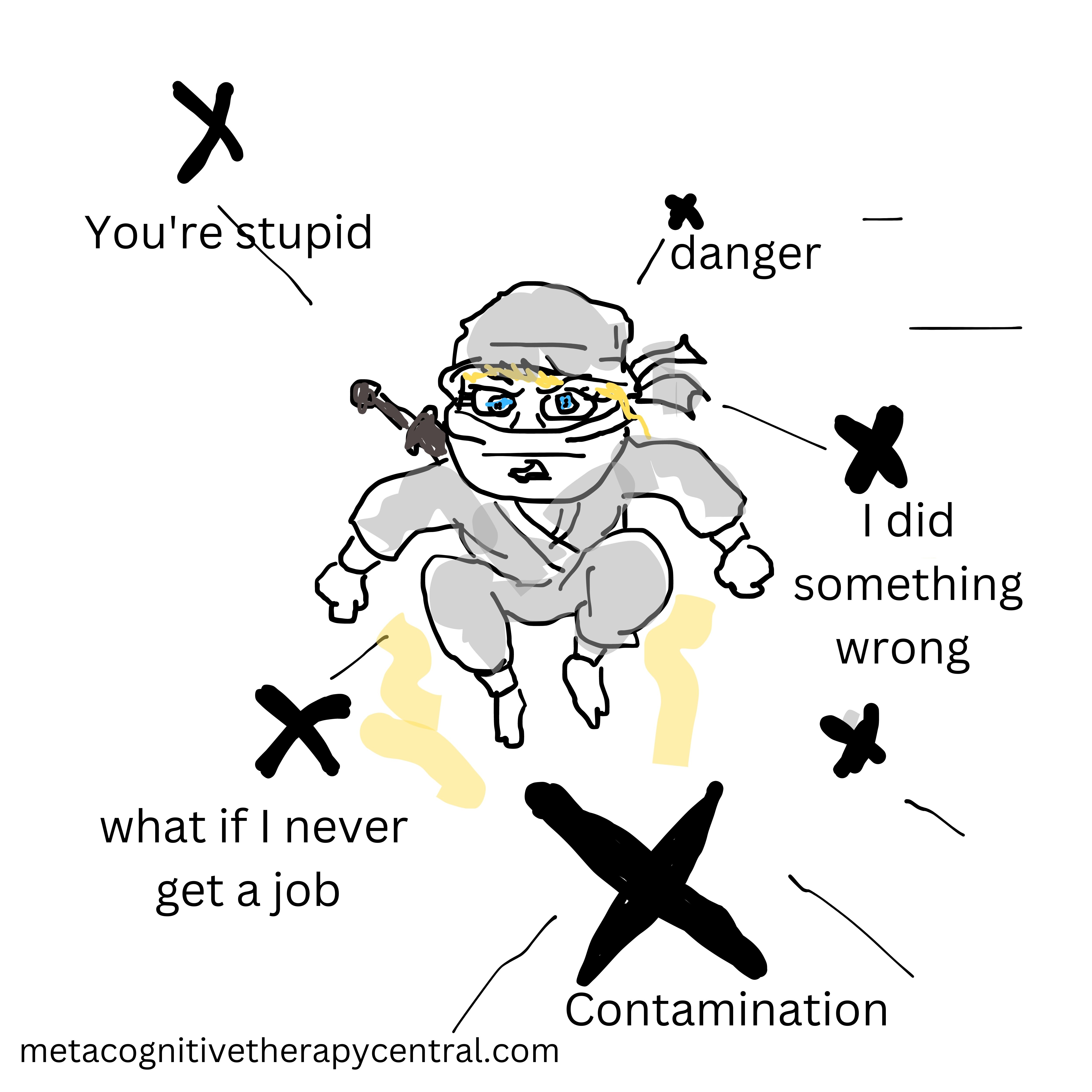
Imagine if your thoughts were like background sounds that you hear but don’t pay much attention to. It could be the sound of church bells or cars passing by outside your window. You notice the sound, and at first, it slightly annoys you because it distracts you from something important, like being on a Zoom call. However, you choose not to focus on the sound and redirect your attention to the meeting. Eventually, the sound stops, and you soon forget it was even there.
Thoughts are similar to fleeting sounds that arise spontaneously in our minds. They consist of words and images, lasting only a few seconds before naturally fading away. Thoughts are not always true or accurate, and they don’t have power over us.
Many people believe that their thoughts carry important messages, or that having certain thoughts indicate danger or signs of a mental illness. However, according to MCT (Metacognitive Therapy), thoughts are not the cause of mental illness. In fact, thoughts are brief, and often the best approach is to allow them to exist without taking them too seriously or pushing them away.
There is an important difference between having thoughts and thinking about thoughts. We can’t directly control what thoughts come up. But we can control how we respond to them.
Here are three important reasons why it’s beneficial not to overly focus on your thoughts.

1) Thoughts are not reality
How often do you pause and consciously acknowledge that you’ve had a thought? Do you automatically accept thoughts as undeniable facts and accurate representations of reality?
Each day, our minds are flooded with thousands and thousands of thoughts. Many of these thoughts may be negative in nature. However, it’s likely that you don’t give equal attention to all of these thoughts. Instead, you dismiss some and choose to focus on those that are meaningful or significant to you.
But here’s the question: How do you determine which thoughts are valid and worth considering, and which ones you can simply let go of? Who gets to decide that only certain thoughts are true facts? Why not all thoughts?
“Some thoughts feel true”
My clients often argue that certain thoughts feel true, and that’s why they believe they should pay more attention to them. But when we dig deeper, they struggle to explain why they feel that way, apart from the strong emotions these thoughts bring up. However, it’s important to remember that emotions alone are not always reliable indicators of what’s true or real.
Think about it – how many times have you strongly felt something, but it didn’t actually happen? Emotions can be influenced by various factors like our personal biases, past experiences, and the situation we’re in.
Ultimately, it’s up to you to decide which thoughts to consider as facts. But it’s worth thinking about how you make that decision. Do you rely on logical reasoning, evidence, and a broader perspective? Or is it more random?
“But I think it all the time so it must be true“
You might think that if a thought keeps appearing in your mind, it must be true. My clients often tell me that they believe some of their negative thoughts because those thoughts come up a lot and make them feel really anxious compared to other thoughts.
For example, thoughts like “I’m not good enough” or “I’m a failure” may show up almost every day, and that makes them feel like these thoughts must be true. The same goes for intrusive thoughts, which are common for people with OCD. Thoughts like “It’s contaminated” or “What if something bad happened?” keep coming back and won’t go away.
But it’s important to remember that just because a thought comes up a lot or makes you feel strongly doesn’t mean it’s actually true. We can learn to question why we believe our thoughts and not automatically assume they’re accurate just because they come up.
Thinking something makes it so is a metacognitive belief and some people have variations of this belief: If I think I am in danger it must mean I am in danger, and, If I have bad thoughts it must mean I want to have them. (metacognitive belief = a belief about our thinking)(1)
However, how often a thought comes up doesn’t mean it’s true or important. The real reason we believe certain thoughts are true or important is because we treat them that way.
When we give special attention to thoughts and act as if they’re true, we start feeling anxious and upset, which makes those thoughts come up more often. Then we mistakenly think those thoughts are important.
Here are some common ways people treat thoughts as if they’re important:
- Worrying about the thought: If someone has a thought like “What if my family gets into an accident?” they start worrying about all the negative things that could happen if that thought were true. They may think about how they would cope, consider canceling plans, or even changing transportation methods.
- Ruminating about the thought: Someone with the thought “I am stupid, I will never learn this,” may ruminate on the social consequences of that thought. They might think about what others will think of them, question their ability to keep a job and start searching for ways to improve themselves.
- Avoiding thinking about the thought: Some people try to push away or distract themselves from certain thoughts. They suppress the thought or engage in activities that divert their attention, hoping to avoid confronting uncomfortable thoughts.
- Acting on the thought: In some cases, when someone has the thought “I am stupid,” they may become silent and refrain from expressing their opinions or ideas. They let the thought dictate their behavior, limiting their participation or contribution in discussions or decision-making processes.
- Performing rituals: Rituals are repetitive behaviors or mental activities that people engage in to reduce anxiety or counteract intrusive thoughts. These rituals can include actions like washing, cleaning, checking things repeatedly, or even mental activities like counting or thinking specific thoughts to neutralize the intrusive thought.
- Seeking reassurance from others: When someone doubts themselves or has worrisome thoughts, they may seek reassurance from others. They might ask their friends, spouse, or loved ones questions like “Do you think I am stupid?” or “Do you think it’s dangerous to drive on that road at this time?” in an attempt to alleviate their doubts or fears.
- Rationalizing and “talking back” to the thought: A technique commonly used in cognitive therapies involves challenging the validity of thoughts. For example, when someone has a negative thought, they start to question the evidence supporting it to reduce its impact.
People with OCD think that by doing rituals, they can stop something bad from happening or make themselves feel less anxious. But it’s important to know that these rituals actually make OCD worse. They make people believe that their thoughts are very important and that they have to do specific things to deal with them.
Let’s take the example of someone who had the thought “I’m not good enough“. When they take this thought seriously, for example by engaging in self-critical rumination, it creates a cycle where they have more of that thought.
This reinforces their belief that thoughts are important. Because why else would the same thought keep coming up all the time, they wonder.
When we view thoughts as facts, we miss out on understanding the true nature of thoughts:
Thoughts are fleeting events in the mind and separate from reality.
Just because we have a thought it doesn’t automatically make it a meaningful fact. It’s more realistic to see thoughts for what they are: just thoughts that are separate from reality.

What is a different way of relating to thoughts?
If you no longer believed thoughts were important and meaningful, would you let them control your actions, the things you start, or who you talk to? How anxious would you really feel if you discovered that you could treat negative and intrusive thoughts just like any other thought?
You can learn to leave intrusive and negative thoughts alone and pay less attention to them. Instead, try to have a relaxed relationship with your thoughts. In Metacognitive therapy, our clients learn a technique called detached mindfulness, which helps them relate to their thoughts in a different and more relaxed way.
There are different ways of relating to thoughts. In object mode, you experience thoughts as facts and part of reality, whereas in metacognitive mode, you view thoughts as separate from yourself and from reality. Detached mindfulness helps you experience thoughts in metacognitive mode.
2) Thoughts don’t dictate behavior
I need to feel motivated to be able to do it
Having bad thoughts means I will act on them
Sometimes we believe that our thoughts determine our actions. For example, people with depression wait to feel motivated before doing things, and those with OCD may think that certain thoughts will make them act on them. So they try to get rid of those thoughts or avoid certain activities until they have the “right” thoughts.
“If I think about harming my children that means I will do it“
“If I think suicidal thoughts I will act on them”
“I need to believe in myself before I can do it”
The truth is, thoughts don’t determine our actions. It’s not true that we can only act if we’re motivated or in the right mindset, or that certain thoughts will make us do bad things. Thoughts, feelings, and impulses are separate from our behavior. We can have a thought and choose not to act on it, or even act against it.
The reason is that thoughts, feelings, and impulses don’t control our actions. Ultimately, we decide which thoughts we want to act upon.
Here’s some evidence:
Have you ever gotten out of bed on a cold morning to get ready for work, even though you didn’t feel like it? Have you done chores without feeling motivated, simply because you chose to do them? Have you gone out to socialize even when you didn’t really want to? Have you spoken politely to someone even though you were upset with them? Have you had unwanted thoughts but didn’t act on them?
If you answered yes to any of those, it means you have control over your behavior regardless of what you think.
You can definitely do things even if you have anxious, demotivated, or tired thoughts. Your thoughts don’t determine how you behave.
You are in control of your behavior. Not your thoughts.
What you should do if you have unwanted thoughts
- Remember, thoughts don’t have control over your behavior. You do.
- You don’t have to wait for motivating thoughts to take action in your life. Just get up and do what needs to be done.
- You don’t have to pay attention to negative thoughts that say you’re not good enough. Keep in mind that thoughts are temporary events in your mind, and you can move forward despite them.

3) You are not your thoughts
Thoughts are like inner mental activities that happen in our minds, along with beliefs, memories, and feelings. They are separate from who we are and how we act, whether they are positive or negative.
Many people feel frightened by their thoughts, especially negative ones, and mistakenly believe that their thoughts define them and who they are as a person.
“I am a failure“
“I wish I had a different partner“
“What if animals sexually arouse me?!”
It’s normal to feel upset by negative thoughts. However, even though they might seem strange at times, they are simply thoughts and they don’t determine your identity.
Negative thoughts are a natural part of the human brain. Our brains generate around 60,000 thoughts each day(2). But does that mean we are defined by all of these thoughts? Do certain thoughts hold more significance for us than others? And who decides which thoughts are important?
Thoughts can change easily and are influenced by many things. We have all kinds of thoughts, some of which are not meaningful or reflective of our true selves. Our minds are capable of entertaining a wide range of ideas, fantasies, and even conflicting thoughts. These fleeting mental occurrences do not necessarily reflect our true selves or define our identities.
Thoughts are brief inner events that constantly change, but we don’t change just because we have specific thoughts. Regardless of how negative or odd they seem. While thoughts are like ideas in our heads, actions are what we actually do in the world. They have the power to make a difference and show our true nature. What define us instead is our actions because they are tangible and observable and they have real world concequences.
We can’t control the thoughts that come up in our minds, including the ones we don’t like. But we do have the power to choose what we do with those thoughts. We can either hold onto them, act based on them, or simply let them go.
If you believe that your thoughts define you, remember this
- You are not defined by your thoughts, but you have thoughts.
- Thoughts are temporary and fleeting experiences in the mind that do not shape your true identity.
- Your actions are a more accurate reflection of who you are as a person.
- Think of thoughts like clouds passing through the sky, while you, as the sky, remain unchanged and unaffected by their movements.
When should I take my thoughts seriously?
When deciding which thoughts to take seriously, consider your core values – the things that are most important to you. If a thought aligns with your values and helps you grow, be happy, or improve your relationships, it’s worth paying attention to.
For example, let’s say that being polite and respectful is important to you. If you have thoughts related to those values when interacting with others you may want to use them to guide your behavior. Still, it is important to practice moderation when it comes to taking certain thoughts seriously. Even when they reflect core values.
TIP: If you are unsure whether you should take a thought seriously try to postpone thinking about it for later. Using worry postponement is an excellent idea if you doubt the validity of your thoughts.
What happens if I don’t respond to negative thoughts?
Not responding to negative thoughts can have a significant impact on your well-being. When you engage with negative thoughts by ruminating, analyzing, or trying to push them away, you inadvertently give them power and prolong their influence over your emotions. When you pay attention to those negative thoughts and let them bother you, they become stronger and can make you feel worse. However, by choosing not to respond to negative thoughts, you break the cycle and take away their control.
By doing this, you create space for more positive thoughts to come in. This helps you focus on the things that are important to you and feel better overall. It’s a way to be mentally strong and resilient.
Summary
- Regardless of their truthfulness, thoughts are still just thoughts.
- Thoughts exist independently from reality as inner events that come and go.
- You assign significance to thoughts because you believe that merely thinking them makes them valid. However, this belief is not accurate.
- How you act is more important than what you think.

References
- Wells, A. (2009). Metacognitive therapy for anxiety and depression. Guilford press.
- Callesen, P. (2017). Lev mere tænk mindre. Politikkens forlag.



